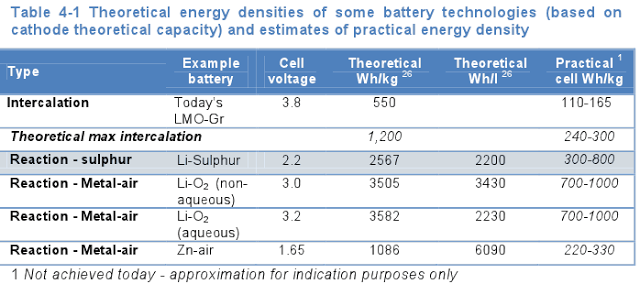

| Visitors Now: | |
| Total Visits: | |
| Total Stories: |

| Story Views | |
| Now: | |
| Last Hour: | |
| Last 24 Hours: | |
| Total: | |
Current and Future Batteries
From
Cost and performance of EV batteries (March 2012, 100 pages)
Currently, cells suitable for transport applications typically have an energy density of 100-180Wh/kg, are available at a capacity of 40 Ah/cell, and (with careful thermal and operational management) may achieve 10 years of life in automotive operation. Automotive cells cost ca. $400/kWh but the actual cost of the battery system is higher due to the need for electronic and thermal management. The whole battery system including cells, structural support, thermal management and electronic balance, is called the battery pack. The cost of a battery pack for a pure EV is approximately $800/kWh, i.e. double the cost of the cells alone.
Automotive cells represent only a marginal share (less than 5%) of the rechargeable lithium-ion cells market. The largest market is consumer electronics, such as batteries for laptops and phones. Consumer cells are smaller and have less stringent performance specifications than automotive cells in terms of power, battery life and safety. Small consumer cells cost under 250$/kWh, but these figures do not translate directly to automotive cells because of their more stringent requirements and the engineering challenge of manufacturing large cells.
The United States Advanced Battery Consortium, a collaboration between major U.S. automakers, has a goal of bringing costs down to under $150 per kilowatt-hour to achieve large-scale commercialization of electric vehicles. Battery makers have driven costs down over the last several years, from about $1,000 per kilowatt-hour to $500 per kilowatt-hour for car batteries.
Sakti3 is developing solid-state batteries that do away with the bulky and dangerous liquid electrolytes used in conventional lithium-ion batteries, potentially doubling energy storage. Toyota, which has a joint venture with battery maker Panasonic, is developing solid-state batteries similar to the ones Sakti3 is pursuing.
See more and subscribe to NextBigFuture at 2012-10-19 00:23:50 Source: http://nextbigfuture.com/2012/10/current-and-future-batteries.html
Source:



